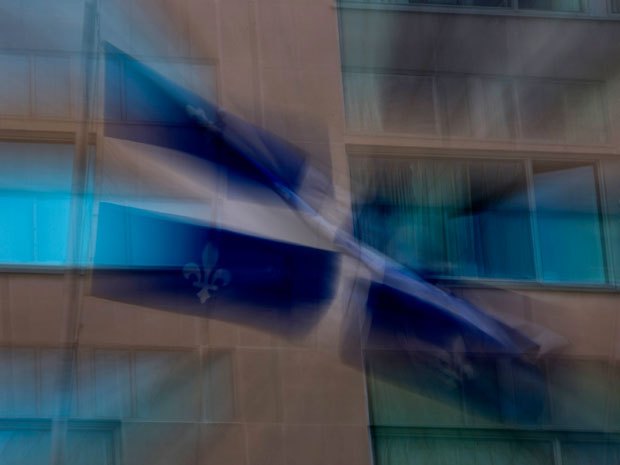After 50 years of grievances, a significant Canadian political lobby will favour a policy of no favours for Quebec
Quebec Premier Pauline Marois says that after Quebec separates—or, as the separatists like to say, “assumes its full sovereignty”—there won’t be any border controls between Canada and Quebec. Quebecers will be able to fly uninterrupted by passport protocol to Victoria and Vancouver and Canadians will be welcomed without similar hindrance to Montreal, Quebec and the vast pure laine hinterland beyond.
There’s just one little problem with that. What does Canada think? It would be a wonderful sovereignty if you set up a border and got to decide what happened on both sides of it. But Quebec won’t actually determine what happens on the Canadian side. Canada will. The governing prejudice among francophone Quebecers is that English Canadians are a cold and unemotional lot compared to Québécois and that they will quickly get over the rupture of separation. After all, as Pierre Karl Peladeau said the other day in explaining how a separatist like himself could own the rabidly pro-Canada Sun chain, “Business is business.”
In fact, for many English Canadians, probably enough to count politically, business won’t be business. Olympic victories and buoyant post-Crash economy notwithstanding, English Canada is still in many ways an insecure place. It may not engage in the emotional pleading of 1995 for Quebecers to stay but it won’t be happy with the rejection implicit in a large chunk of the country—even an often-resented part of the country—opting to leave. Mme Marois and her colleagues will protest that their movement is pro-Quebec, not anti-Canada. But let’s get real. Fifty years of unremitting grievance says otherwise. Post-separation, a significant political lobby will favour a policy of no favours for Quebec, even if it means incurring costs on the Canadian side.
A second problem with the idea that there won’t be border arrangements is simple logic. For several hundred years a principal attribute and indicator of sovereignty has been a country’s ability to control its borders. Countries generally want to determine who their residents are and to control and tax what goods are imported. We’re supposed to believe Quebec wants a flag, a seat at the UN, diplomatic recognition from all the countries of the world but not control of its borders? Doesn’t seem likely. There may be two lines at Trudeau Airport in Montreal—which surely won’t be Trudeau Airport any more—one for “Canadians” and one for “Others.” But you can be sure there will be lines. Same thing on the main highways into the new country.
Advertisement
A third problem, one Mme Marois should be well acquainted with, is democratic politics. As soon as Quebec and Canada go their separate ways the domestic political calculus of each country changes. At the moment, Quebec dairy farmers benefit disproportionately from the Canadian supply management system. Would-be reformers in the rest of the country have been stymied by successive federal governments’ unwillingness to antagonize Quebec and risk encouraging separation by ending this costly protection racket. After Quebec goes that obstacle to reform evaporates.
Suppose Canada decides it wants cheap milk, does away with supply management and lets in US milk tariff-free. What does Quebec do? If it decides to keep supply management and high dairy prices, what happens when cheap Canadian and American milk starts flowing up the 401 into the new country? Does it shrug and sigh and accept this as a cost of independence or does it set up customs houses and start controlling imports of milk?
Last time I looked the PQ’s trade policy for independence was a continuation of NAFTA, meaning it wants free trade with both Canada and the US. That doesn’t happen automatically just because Quebec wants it, of course. But even if it does, there are problems. Having a free trade area doesn’t mean all goods coming from Canada and the US get in free. It means all goods produced in Canada and the US (and Mexico) get in free. But Quebec will have to check to make sure the goods coming in from Canada are actually North American in origin. If it doesn’t check, it’s effectively inviting non-North American countries to make an end-run around its own tariffs by going through Canada.
This is not a problem if Quebec’s tariffs are the same or lower than Canada’s. But Quebec is a land of high taxes and powerful unions. And the instinct of Quebec Inc’s stakeholders is always to do everything locally. Even before separation its official agricultural policy—almost two and a half centuries after Adam Smith explained the virtues of international trade—is to encourage self-sufficiency. The commercial policy that emerges from its democratic processes is very likely to favour protection. Probably more protection than a Canada in which the western provinces now had much more say and sway would choose.
Of course, the classic way to avoid having to administer these “rules of origin” is to form a customs union with your trading partner, which means you charge the same tariffs on third-country goods. If the Canadian and Quebec tariffs on a good were the same, Quebec wouldn’t have to check whether goods coming up the 401 were North American or not. If they weren’t, they would have paid the Canadian tariff to get into Canada and since the Canadian tariff would be the same as the Quebec tariff there wouldn’t be any end-run around Quebec’s higher tariff (which wouldn’t be higher!).
But even Mme Marois would have to concede that the day after separation would be a strange time for Canada and Quebec to sit down and negotiate a customs union.
We all pray there won’t be blood. There will be border controls.
William Watson: No Canada-Quebec border controls? R-i-i-i-ght

























Laissez un commentaire Votre adresse courriel ne sera pas publiée.
Veuillez vous connecter afin de laisser un commentaire.
Aucun commentaire trouvé